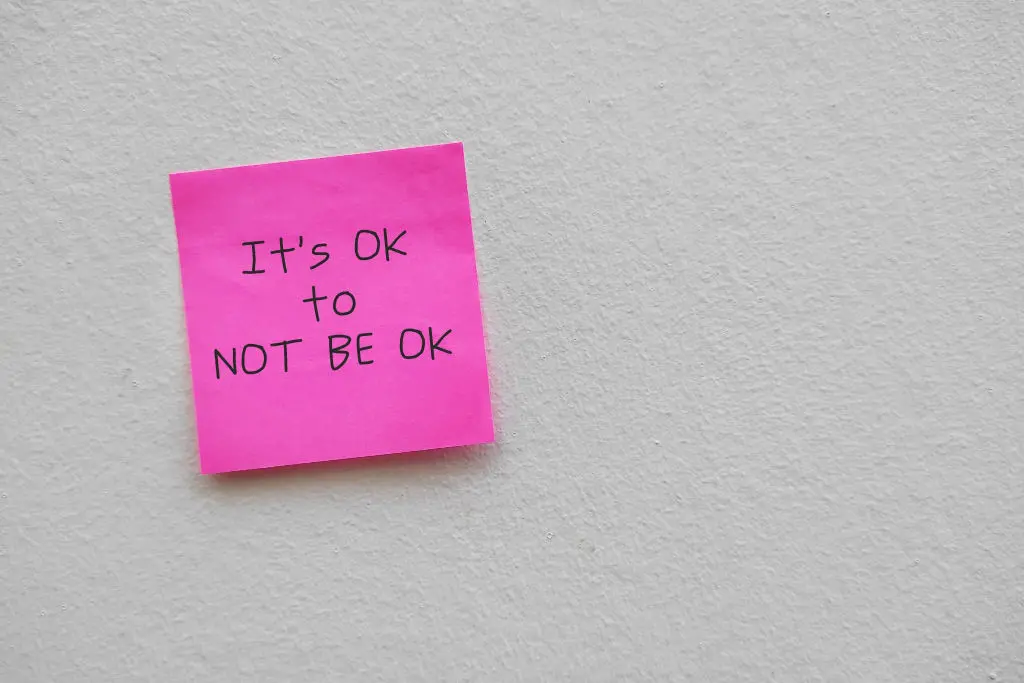Why Talking About Our Mental Health Is SO Important

September 8, 2022 - Updated September 12, 2024

Today is R U OK? Day, a day designed by the Australian harm prevention charity to encourage meaningful connection and inspire people to start a conversation to support those who might be struggling by asking those three simple words, “are you ok?”. The following article discusses mental health but is not intended to be used to treat or prevent any mental health condition. If you have or suspect you might be suffering from a mental health condition, please consult your doctor.
According to the World Health Organisation, one in every eight people live with a mental health disorder, the most common being anxiety and depression.
While these conditions are incredibly prevalent around the world - and the number of people living with anxiety and depression has increased significantly due to the Covid-19 pandemic - most people don’t have access to effective care and many still face significant stigma, with many of us shying away from important conversations about our mental health struggles.
R U OK? Day encourages people to start meaningful discussions with their friends and loved ones about mental health. Because sometimes, a simple conversation can change a life.
Why is talking about mental health so important?
Mental health is a key part of your overall health and wellbeing and being healthy is about so much more than how you treat your physical body.
Whether it’s seeking out professional help when you need it or finding simple ways to recharge emotionally through practices such as meditation, gratitude or screen-free time, being in touch with your mental health is SO important for your overall wellbeing.
For many, talking about your own mental health or engaging in meaningful conversation with friends and loved ones about their own mental health challenges is sadly still a taboo subject. According to Mayo Clinic, persistent negative attitudes and beliefs toward those who have a mental health condition is all too common and often leads to discrimination, while studies have also suggested that removing the stigma around mental health would lead to more people seeking care or treatment.
With many choosing to stay silent in the face of their own personal struggles with conditions such as anxiety and depression, more education is needed as to what living with these conditions is really like, how common they are, and what adequate support looks like. This is just one of many reasons why starting a meaningful dialogue is SO important.

The power of that first step
Starting a conversation about how you’re really feeling and the struggles you might be facing is often the first step in seeking professional help, care and treatment. These open and honest discussions are important, whether you’re the one struggling or the one reaching out to someone. Mayo Clinic highlights that, if you know someone who is struggling or showing signs of mental illness, these conversations offer encouragement and support and can help them to make an appointment with a qualified professional.
As research from R U OK? points out, many people who are struggling (over half of Australians surveyed) wish someone had asked them if they were okay in the last 12 months, with a significantly higher number of women reporting that they had lost sleep over something that was troubling them more than five times in the past year.
R U OK? say that knowing the signs and being able to recognise when something isn’t quite right can increase conversation confidence, with one in two believing they would be more confident about starting a conversation if they knew the signs.
What signs should you look out for?
R U OK? encourages people to look at what people are saying, doing and what’s going on in their life. For example, are they moody? Concerned about the future? Becoming withdrawn? Under significant personal or professional pressures? These are just some of the signs to look out for if you’re wondering if it’s time to start a conversation and ask them, “are you okay?”.
Other signs include:
If they appear confused or irrational
If they appear unable to switch off
If they appear lonely or lacking in self-esteem
If they are concerned about the future
If they are concerned they are a burden to others
If they are concerned they’re trapped or in pain
If they are displaying changes in behaviour including mood swings and becoming withdrawn
If they are displaying changes in their online behaviour
If they appear to be losing interest in the things that they love
If they appear unable to concentrate
If they appear less interested in their appearance and personal hygiene
If they begin behaving recklessly
If they are experiencing issues in their personal life, including their relationship, health problems or a recent personal loss
If they are experiencing work pressures or financial difficulties
How to start the conversation
Mental Health America is another organisation that encourages people to start a conversation about their mental health through their “Time To Talk” tips. They recommend setting aside 30-60 minutes for the conversation, and suggest starting with a text if a face-to-face conversation feels too intimidating.
Think Mental Health, a Western Australian government initiative, recommends choosing an environment where the person will feel comfortable to talk without distractions. While “are you ok?” is a great starting point, they also recommend other questions such as:
You don’t seem yourself lately, what’s going on?
Tell me about what is going on?
What’s happening for you?
I’ve noticed you haven’t been going out lately, is there anything you’d like to talk about?
Other conversation starters, according to the organisation Headspace, could be more general and open, such as “how is work going?”. They also recommend using “I” statements to encourage the person to focus on more specific thoughts and feelings such as “I’ve noticed that you seem to have a lot on your mind lately. I’m happy to talk or listen and see if I can help.” or “You seem sad - what is happening for you? Just letting you know that I care, and we can work it out together.”
Remember that when starting a conversation like this, to be prepared that someone might answer that they’re not ok, in which case you should encourage them to take action (including seeking out professional help where appropriate) and check in with them afterwards.
Opening up about mental health with your friends and loved ones is an incredibly brave thing to do, and as intimidating as it can feel to start that first conversation, it’s ultimately so worthwhile. By recognising the signs that something might not be right and starting that first conversation, we can help the people in our life feel supported and encourage them to seek help.
If you are in crisis and require urgent help or support please contact emergency services.

A more empowered you starts with Sweat, and our editorial team is here to bring you the latest fitness tips, trainer recommendations, wellbeing news, nutritional advice, nourishing recipes and free workouts.
* Disclaimer: This blog post is not intended to replace the advice of a medical professional. The above information should not be used to diagnose, treat, or prevent any disease or medical condition. Please consult your doctor before making any changes to your diet, sleep methods, daily activity, or fitness routine. Sweat assumes no responsibility for any personal injury or damage sustained by any recommendations, opinions, or advice given in this article.
Wellbeing